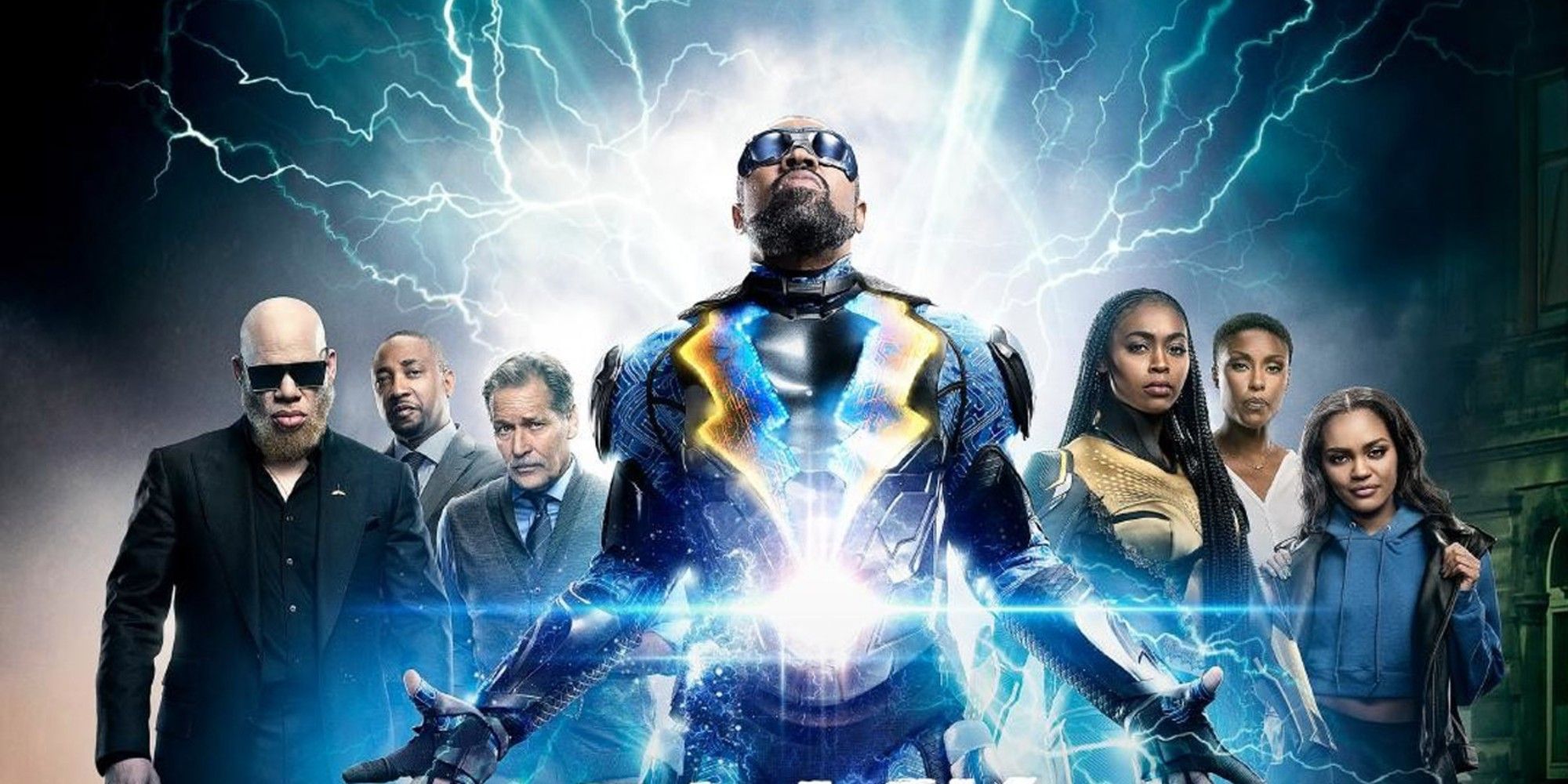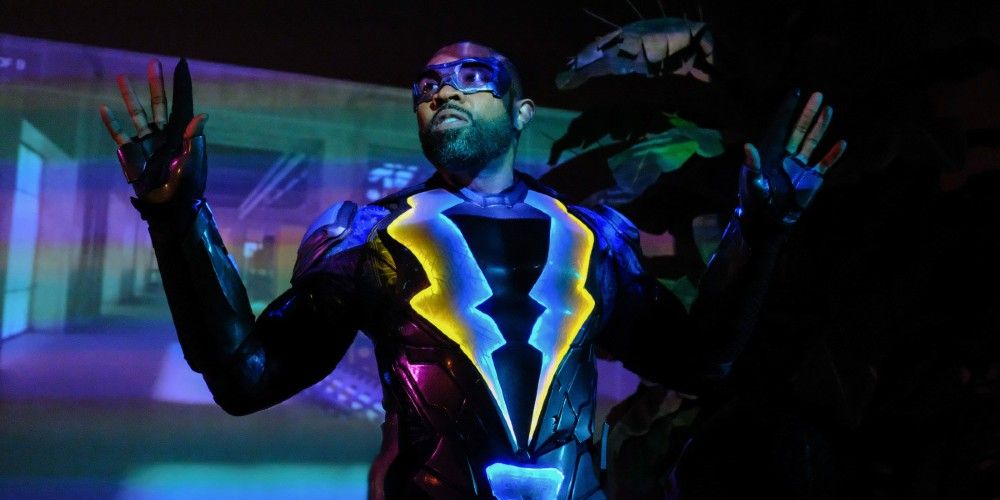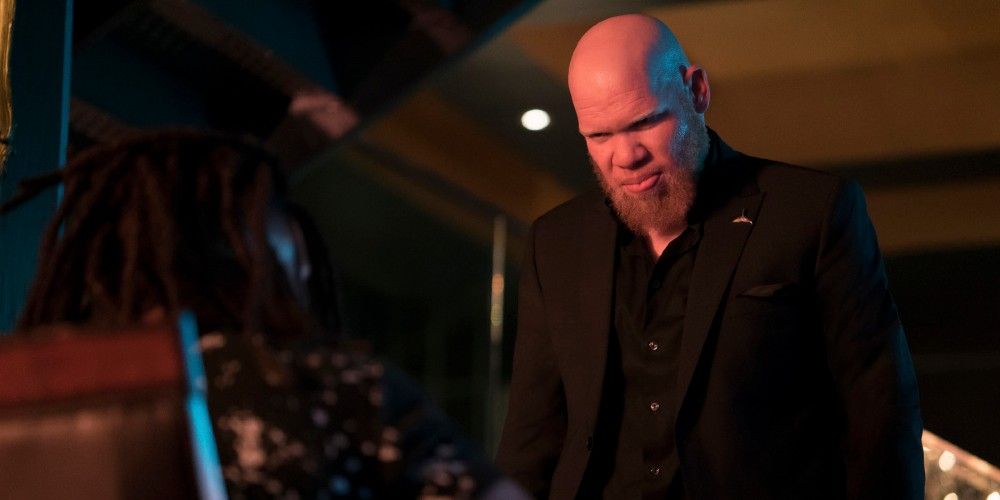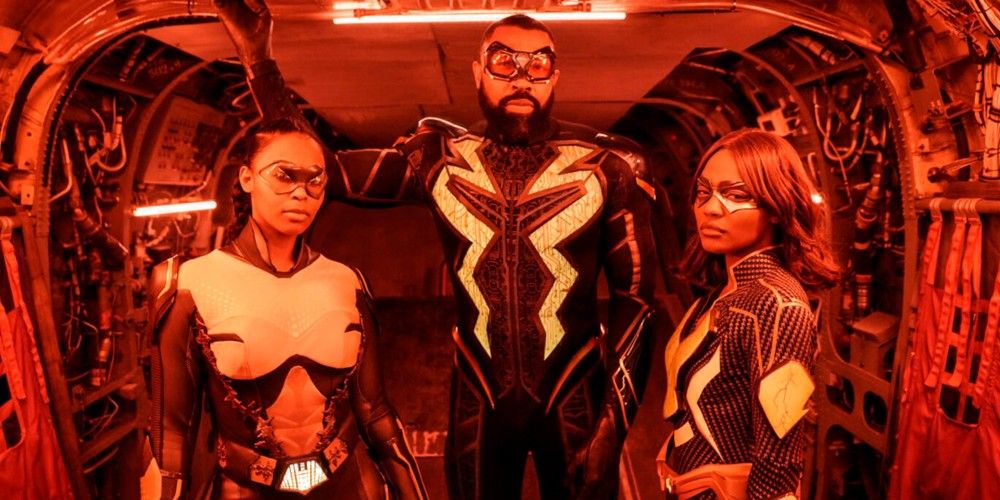Black Lightning is currently airing its 4th and final season on the CW. Although nominally folded into the CW’s Arrowverse via the multiverse events of their “Crisis on Infinite Earths” crossover, Black Lightning always existed in its own orbit, distinct from the other DC (or even Marvel) Superhero TV adaptations. Based upon the comics’ electricity-powered vigilante, Jefferson Pierce (Cress Williams) has actually retired from his “Black Lightning” identity by the pilot episode, focusing his full efforts as principal of Garfield High and raising his children Anissa (Nafessa Williams) and Jennifer (China Anne McClain). However, incidents involving both “the 100” gang and abusive police in his home city of Freeland cause Jefferson to come out of retirement and take back control as Black Lightning.
Produced and developed by husband-and-wife team Mara Brock Akil and Salim Akil, Black Lightning is already a cut above other CW shows with its gripping actors and strong direction. It is still a superhero show, with the flashy costumes and soapy melodrama that makes such properties so fun. But Black Lightning often deviates from the formula other CW shows follow, boasting unique aspects and a fiery spirit that makes it well worth watching. It is not always a perfect show, but there are still many reasons to check out Black Lightning.
Authentic Representation
As evident from its title, Black Lightning is an unapologetically Black show. Both the cast and crew are predominantly Black, and the show frequently deals with African-American pride, slang, and culture. Of course, superheroes like Black Panther and Luke Cage also address such topics, but Black Lightning adds a remarkably complex and authentic voice to celebrations of diversity. For instance, one story-thread has Jefferson be replaced as Garfield’s principal by the Caucasian Mike Lowry (P.J. Byrne), who has far less tolerance for the majority African-American students than Jefferson does. The show touches upon issues as diverse as police brutality to destroying Confederate statues, but Black Lightning is never preachy about such topics, with Jefferson holding differing opinions with his family and even the two sides of his secret identity.
Often, such disagreements are divided between Jefferson and his daughter Anissa. In the pilot, Jefferson quotes Martin Luther King Jr. to her to emphasize the need for respectability, to which Anissa responds with Fannie Lou Hammer. While Jefferson generally trusts the system and views his vigilantism as a minor corrective, Anissa tends to be more radical and prepared to overhaul resources to help others. She is also a lesbian, although her sexuality is not made a major focus, since she came out years before the show. Instead, Season 1 shows Anissa discovering her father’s secret alter-ego and developing her own superpowers, adopting the codename “Thunder” to help out Freeland.
And the city of Freeland is complicated in Black Lightning. It can be tempting to view crime and violence as reductively binary, especially in Superhero stories. But Black Lightning shows how gangs and drugs can become entwined with “legitimate” business, and empathizes with the struggles of working-class communities caught up in them. It even explicitly compares the shady governmental A.S.A. experimenting on Freeland’s population to create “metahumans” with the real-world Tuskegee Experiments, drawing attention to important historical injustices.
So Black Lightning tackles some heavy themes, but it is not a heavy show. There’s plenty of laughter, stylish action, and emotional storytelling to be found. It’s simply that the immediacy of its issues creates an authentic core for the characters to build off of, making you increasingly invested in them over the course of the show. Plus, such diversity extends to the show’s spectacular soundtrack, scoring scenes to gems like “Release the Beast,” “Rescue Me,” “Let’s Straighten It Out,” and Billy Paul’s “Am I Black Enough For You?”.
Compelling Villains
Many of these early music choices are courtesy of “Lala” (Will Catlett), a high-ranking member of the 100, who undergoes grueling and unexpected changes throughout the four seasons. Lala is currently back in charge of the 100, but he has also become a quasi-immortal variation of the Tattooed Man (a minor DC supervillain). Black Lightning may grapple with realistic societal issues, but the show also throws in strange sci-fi elements and characters with little fanfare. But often the lack of introductions and explanations makes minor henchmen – such as enforcer Syonide (Charlbi Dean) – that much more mysterious and memorable.
Black Lightning forgoes a “villain of the week” formula, instead focusing on the villain’s long-term schemes develop over time, with episodes often constructed as three-episode long “Books.” A major antagonist pulling the strings is Tobias Whale (Marvin "Krondon" Jones III), an albino crime lord who killed Jefferson’s father and is ruthless at every step. After hearing of Black Lightning’s return, he even harpoons Lala and rhetorically asks him if he “believes in The Resurrection.” Tobias’ actor has a commanding presence that makes him always captivating to watch, especially when combined with Tobias’ superior attitude towards Freeland stemming from the discrimination he’s faced as an African-American albino.
One ploy of Tobias leads to the creation of Painkiller (Jordan Calloway), through manipulating high-school track-star, and Jennifer’s boyfriend, Khalil. Painkiller initially acts as an enforcer for Tobias, but his abusive behavior causes him to try and run away with Jennifer instead. Jordan Calloway plays the tumultuous journey of Painkiller beautifully, especially when he becomes brainwashed as an ice-cold assassin in Season 3. It’s little surprise the Akils are developing a spinoff Painkiller series for the CW. It’s also worth mentioning the A.S.A.’s Agent Odell (Bill Duke), who is responsible for Painkiller’s brainwashing, and is a chilling antagonist throughout Seasons 2 and 3 from his willingness to sacrifice anybody to preserve the authority of the A.S.A. in Freeland.
Mature Storytelling
The Pierce family battle against these foes, but often find themselves in uneasy alliances with them. Loyalties subtly shift in Black Lightning, including within the affectionate family unit. Jefferson is actually divorced from his ex-wife, neuroscientist Lynn Stewart (Christine Adams), but the two are continually drawn back to each other. Like many elements of Black Lightning, such dynamics are surprisingly unstable, which only adds to the endearing authenticity and maturity of the show.
Black Lightning’s status as a middle-aged father sets him apart from other CW Superhero shows (with the exception of the recent Superman & Lois). Although Green Arrow (Stephen Amell) is revealed to have children in Arrow, and the Flash (Grant Gustin) becomes a father through time-travel, both instances are unexpected twists design to shake up later seasons. Jefferson begins Black Lightning as a dad, and the weight and responsibilities of family are baked into the show. This includes Jennifer’s frustrations about her parents coddling her newfound powers, or Jefferson having a minor break-down in the Season 2 finale, telling his family how he “worries all the time” about their safety. Such touching scenes are earned by how the characters are portrayed and developed.
Black Lightning has a surprising edge to it, not only with sometimes brutal scenes – Tobias once rips out Painkiller’s spine – but how the characters cope with such events, and debate the morality of their actions. Again, Black Lightning is not a dark and dour show, but manages a smart mixture of serious issues with bombastic action and fun characters. It’s not always perfect, but at its best, Black Lightning can be essential and electric viewing.




